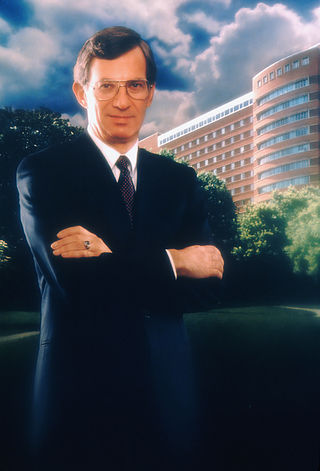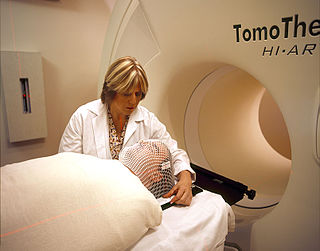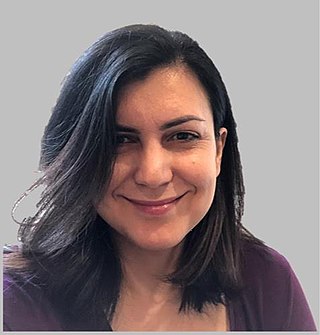Related Research Articles
A radiation oncologist is a specialist physician who uses ionizing radiation in the treatment of cancer. Radiation oncology is one of the three primary specialties, the other two being surgical and medical oncology, involved in the treatment of cancer. Radiation can be given as a curative modality, either alone or in combination with surgery and/or chemotherapy. It may also be used palliatively, to relieve symptoms in patients with incurable cancers. A radiation oncologist may also use radiation to treat some benign diseases, including benign tumors. In some countries, radiotherapy and chemotherapy are controlled by a single oncologist who is a "clinical oncologist". Radiation oncologists work closely with other physicians such as surgical oncologists, interventional radiologists, internal medicine subspecialists, and medical oncologists, as well as medical physicists and technicians as part of the multi-disciplinary cancer team. Radiation oncologists undergo four years of oncology-specific training whereas oncologists who deliver chemotherapy have two years of additional training in cancer care during fellowship after internal medicine residency in the United States.
Surgical oncology is the branch of surgery applied to oncology; it focuses on the surgical management of tumors, especially cancerous tumors.

Vincent Theodore DeVita Jr. is the Amy and Joseph Perella Professor of Medicine at Yale Cancer Center, and a Professor of Epidemiology and Public Health. He directed the Yale Cancer Center from 1993 to 2003. He has been president of the board of directors of the American Cancer Society (2012-2013). He is internationally recognized as a pioneer in the field of oncology for his work on combination-chemotherapy treatments.

Linda Susanne Gottfredson is an American psychologist and writer. She is professor emerita of educational psychology at the University of Delaware and co-director of the Delaware-Johns Hopkins Project for the Study of Intelligence and Society. She is best known for writing the 1994 letter "Mainstream Science on Intelligence", which was published in the Wall Street Journal in defense of Richard Herrnstein and Charles Murray's controversial book The Bell Curve (1994).
Nicholas J. Vogelzang was a medical oncologist with Comprehensive Cancer Centers of Nevada (CCCN). He serves as medical director of the Research Executive Committee and Associate Chair of the Developmental Therapeutics and Genitourinary Committees for US Oncology Research. His research interests include clinical trials for genitourinary malignancies and mesothelioma.
Adjuvant therapy, also known as adjunct therapy, adjuvant care, or augmentation therapy, is a therapy that is given in addition to the primary or initial therapy to maximize its effectiveness. The surgeries and complex treatment regimens used in cancer therapy have led the term to be used mainly to describe adjuvant cancer treatments. An example of such adjuvant therapy is the additional treatment usually given after surgery where all detectable disease has been removed, but where there remains a statistical risk of relapse due to the presence of undetected disease. If known disease is left behind following surgery, then further treatment is not technically adjuvant.
The Society of Gynecologic Oncology (SGO), headquartered in Chicago, Illinois, is the premier medical specialty society for health care professionals trained in the comprehensive management of gynecologic cancers, affecting the uterus, fallopian tubes, ovaries, cervix, vagina, and vulva. As a 501(c)(6) organization, the SGO contributes to the advancement of women's cancer care by encouraging research, providing education, raising standards of practice, advocating for patients and members and collaborating with other domestic and international organizations.

Jane Cooke Wright was a pioneering cancer researcher and surgeon noted for her contributions to chemotherapy. In particular, Wright is credited with developing the technique of using human tissue culture rather than laboratory mice to test the effects of potential drugs on cancer cells. She also pioneered the use of the drug methotrexate to treat breast cancer and skin cancer.

Yale Cancer Center (YCC) was founded in 1974 as a result of an act of Congress in 1971, which declared the nation's "war on cancer". It is one of a network of 56 Comprehensive Cancer Centers designated by the National Cancer Institute (NCI). Currently directed by Dr. Eric Winer, the Cancer Center brings together the resources of the Yale School of Medicine (YSM), Yale New Haven Hospital (YNHH), and the Yale School of Public Health (YSPH).

Oncology is a branch of medicine that deals with the study, treatment, diagnosis, and prevention of cancer. A medical professional who practices oncology is an oncologist. The name's etymological origin is the Greek word ὄγκος (ónkos), meaning "tumor", "volume" or "mass". Oncology is concerned with:

Cancer treatments are a wide range of treatments available for the many different types of cancer, with each cancer type needing its own specific treatment. Treatments can include surgery, chemotherapy, radiation therapy, hormonal therapy, targeted therapy including small-molecule drugs or monoclonal antibodies, and PARP inhibitors such as olaparib. Other therapies include hyperthermia, immunotherapy, photodynamic therapy, and stem-cell therapy. Most commonly cancer treatment involves a series of separate therapies such as chemotherapy before surgery. Angiogenesis inhibitors are sometimes used to enhance the effects of immunotherapies.

Min Chiu Li was a Chinese-American oncologist and cancer researcher. Li was the first scientist to use chemotherapy to cure widely metastatic, malignant cancer.
Eric P. Winer is a medical oncologist and clinical researcher specializing in breast cancer. He is director of Yale Cancer Center and president and physician-in-chief of Smilow Cancer Hospital Yale New Haven Health System, effective February 1, 2022. He also is Deputy Dean for Cancer Research at Yale School of Medicine. From 1997 to 2021, he was the Chief of the Breast Oncology Program at Dana–Farber Cancer Institute in Boston, Massachusetts. Beginning in 2013, he held a range of institutional roles at Dana-Farber, including Chief of Clinical Development, the Thompson Chair in Breast Cancer Research and Director of the Dana-Farber/Harvard SPORE in Breast Cancer. He also served as a Professor of Medicine at Harvard Medical School. He was president of the American Society of Clinical Oncology (ASCO) 2022-2023 and became Chair of the Board in mid-June 2023. His career has been focused on breast cancer treatment and research.
Professor Dame Lesley Jean Fallowfield DBE is a British cancer psychologist and a professor of psycho-oncology at the University of Sussex. The main outcomes of her research have been the establishment of assessment tools to measure quality of life in clinical trials of cancer patients and the design of educational programmes to improve oncologists' communication with their patients.

Julie Ann Sosa is a professor and chair of the Department of Surgery at the University of California, San Francisco (UCSF) and holds the Leon Goldman, MD, Distinguished Professorship in Surgery. She currently serves as the Treasurer of the American Thyroid Association and Editor-in-Chief of the World Journal of Surgery.

Ordinary Love is a 2019 romantic drama film, directed by Lisa Barros D'Sa and Glenn Leyburn, from a screenplay by Owen McCafferty. It stars Liam Neeson and Lesley Manville.

Brigid Gray Leventhal was a British-American pediatric oncologist. She was the first director of the Pediatric Oncology Division at Johns Hopkins University, a position she held from 1976 to 1984. She was inducted into the Maryland Women's Hall of Fame in 1996.

Maryam Beheshti Lustberg is an American breast oncologist. She is the Director of The Breast Center at Smilow Cancer Hospital and Chief of Breast Medical Oncology at Yale Cancer Center. Lustberg previously served as the Medical Director of Supportive Care at Ohio State's Comprehensive Cancer Center and President-Elect of the Multinational Association of Supportive Care in Cancer. She is also an associate editor for the peer-reviewed medical journal covering oncology nursing with respect to cancer survivors called Journal of Cancer Survivorship. Lustberg was also recognized as one of the 100 Influential Women in Oncology by OncoDaily.
Bradley J. Monk is an American gynecologic oncologist, academician and researcher. He is a Professor on the Clinical Scholar Track in the Department of Obstetrics and Gynecology at the University of Arizona College of Medicine in Phoenix, Arizona, as well as at the Creighton University School of Medicine in Omaha, Nebraska. He also serves as Director of the Division of Gynecologic Oncology at the St. Joseph's Hospital and Medical Center in Phoenix.
Timothy Michael Pawlik is an American surgical oncologist. He is the Chair of the Department of Surgery and the Urban Meyer III and Shelley Meyer Chair for Cancer Research at Ohio State University and Surgeon-in-Chief at the Ohio State University Wexner Medical Center.
References
- ↑ Wilson, John K. (28 October 2011). "An Interview with Joan DelFattore on Academia". academeblog.org.
- 1 2 3 4 "Profile - Joan DelFattore - the Authors Guild".
- 1 2 "DelFattore, Joan". encyclopedia.com.
- 1 2 3 "Joan DelFattore". Master of Liberal Arts, University of Delaware (mals.udel.edu).
- ↑ DelFattore, Joan (4 January 2011). "Defending Academic Freedom in the Age of Garcetti". American Association of University Professors (aaup.org).
- ↑ "Joan DelFattore - Delaware Humanities". 30 March 2022.
- ↑ Manser, Ann (September 16, 2019). "'Death by Stereotype?' Unmarried cancer patients may receive second-best treatment". UDaily, University of Delaware.
- ↑ "review of What Johnny Shouldn't Read: Textbook Censorship in America by Joan DelFattore". Kirkus Reviews. July 1992.
- ↑ "review of What Johnny Shouldn't Read: Textbook Censorship in America by Joan DelFattore". Publishers Weekly. August 1992.
- ↑ "review of The Fourth R: Conflicts over Religion in America's Public Schools by Joan DelFattore". Publishers Weekly. March 2004.
- ↑ Stubblefield, Jessica (3 May 2013). "review of Knowledge in the Making: Academic Freedom and Free Speech in America's Schools and Universities by Joan DelFattore". Journal of Educational Administration. 51 (3): 407–410. doi:10.1108/09578231311311537.